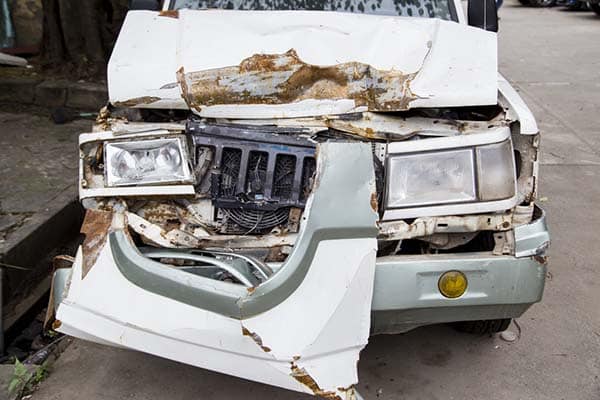There were 5.93 million motor vehicle accidents (MVAs) in 2022 in the United States. In addition to potential medical and legal needs following their accidents, drivers may worry about losing their source of transportation if their car is totaled. Let’s look at how insurance companies determine if your car is totaled, and what to do if your car is totaled in an accident.
Contact Bernstein Injury Law to schedule a free consultation today.
Were you injured in a car accident? Contact Jack Bernstein, Injury Attorneys, now.

What Does “Totaled” Really Mean?
So, what is considered a totaled car? When the cost of repairing a vehicle exceeds the vehicle’s actual cash value (ACV), it’s classified as a totaled car.
Then, who determines whether a car is totaled? Insurance companies evaluate vehicles involved in accidents when processing claims. They determine the vehicle’s ACV prior to the crash and compare it to the cost of repairs. State laws are another factor. Florida insurance companies must refer to Florida’s legal statutes to determine if they must consider the car totaled.
In 2023, insurance companies classified 27% of cars involved in accidents as totaled.
Since the insurance company’s determination that a car is totaled is based on its value, it’s sometimes possible to repair a car that the insurance company ruled a total loss. Someone operating an older vehicle may have it written off, even if it sustained minor damage, but it could still be salvageable. However, if this is the case, insurance will not pay for the cost of repairs since they deemed it totaled.
Critical Factor: Actual Cash Value (ACV)
The actual cash value (ACV) refers to the total cash value of the vehicle right before the crash occurred. The ACV is the amount of money you could have reasonably expected to be paid if you sold the car before your accident.
Insurance companies use reputable sources, such as Kelley Blue Book, Edmonds, and the National Automobile Dealers Association (NADA), to determine a vehicle’s value. They calculate the ACV before comparing that figure to the estimated cost of repairs.
Insurance companies may ask about the condition of the vehicle or use CarFax to determine if there were prior issues that would affect the vehicle’s value. Factors affecting a vehicle’s value include the following:
- Age
- Condition
- Depreciation for make and model
- Market value
- Mileage
Kelley Blue Book includes the potential resale amount and depreciation rate for vehicles based on their make, model, and year.
The 80% Rule in Florida: Threshold for Total Loss
If a state has no total loss statute or a 100% statute, a car is totaled if the cost of repairs exceeds the vehicle’s ACV.
Florida has an 80% rule that applies. It considers the vehicle’s salvage value and the cost of repairs. Those figures are combined. The car is totaled if the combined total is 80% or more of the vehicle’s ACV.
Suppose you’re in an accident. Your insurance company refers to Kelley Blue Book and determines your vehicle’s value is $20,000.
Mechanics estimate the cost of repairs to be $6,000.
Local salvage yards determine the salvage value of your vehicle is $9,000.
The cost of repairs and the salvage value totals $15,000, which is 75% of the ACV. Your insurance company would not write off the vehicle.
About Jack G. Bernstein Esq.
Personal Injury Lawyer

For more than 40 years, personal injury lawyer Jack G. Bernstein — a member of the Florida State Bar Association, the Hillsborough Bar Association, and the Clearwater Bar Association — has protected the rights of individuals injured by a negligent party.
Mr. Bernstein has the expertise to handle various injury cases, including, but not limited to, car accidents, medical malpractice cases, cruise ship accidents, accidental drownings, wrongful death lawsuits, along with most injury and catastrophic occurrences, and legal malpractice issues.
With a staff of approximately 40 people, including six lawyers and 34 support personnel, Jack Bernstein, Injury Attorneys, handles every type of personal injury and accident case throughout Tampa, Sarasota, St. Petersburg, and Clearwater, FL. Our office has the legal resources to get the justice you deserve and the maximum recovery for your losses. Schedule your free consultation today; we are always here to help.
What Factors Influence the “Totaled” Decision?
Determining if a car is totaled involves considering several factors.
1. Cost of Repairs
An insurance adjuster may assess the vehicle and calculate the cost of repairs. Insurance companies may also use estimates from reputable mechanics. They may secure these estimates or give you the names of local mechanics and instruct you to obtain repair estimates that will be used to calculate the repair costs.
2. Age and Condition of Vehicle
The insurance company will confirm the vehicle’s age, make, model, year, depreciation value, mileage, and condition prior to the crash. Older vehicles with high mileage have a lower value, and a vehicle in poor condition will also have a lower resale value.
3. Severity of Damage
The damage sustained is a critical factor when determining whether a car is totaled. Vehicles with minor damage may be written off if they have a low ACV. Although a vehicle with a high ACV may not have a salvage value and repair cost that’s 80% of its ACV, it may still be written off if the nature of the damage makes it unsafe. For example, significant structural damage may be grounds to write off a vehicle even if it doesn’t meet the 80% threshold.
If Airbags Deploy, Is the Car Totaled in Florida?
Airbags are safety features designed to deploy during a collision. Airbags can prevent motorists from being injured in a crash or reduce the severity of their injuries.
If your airbags deployed during a crash in Florida, you may wonder if your car is automatically considered totaled. However, the deployment of airbags does not necessarily mean the car is totaled. Insurance companies will still use the 80% rule to determine if the car is totaled.
What Happens After Your Car is Declared Totaled in Florida?
If your car gets totaled, you may wonder what happens next and how this determination will affect you financially. If your car is totaled, will the insurance pay it off?
Will the Insurance Company Offer a Settlement?
You may wonder what happens if insurance totals your car and how this affects you financially. If the insurance company determines your car is totaled, they will offer you a settlement based on its ACV.
What Happens When Your Car Is Totaled by Your Insurance Company?
They use the ACV and deduct your deductible costs from the ACV to determine how much money they’ll give you to replace the vehicle.
Before accepting your insurance company’s settlement offer, ask for the total loss valuation report showing how they calculated your vehicle’s ACV. You should check to see if the settlement offer includes related costs, including the following:
- Sales tax
- Vehicle registration fees
- Vehicle title and license plate transfer fees
You may be entitled to compensation for those costs.
Do You Need To Surrender the Totaled Vehicle?
Once your insurance company determines your car is totaled, you must transfer ownership to the insurance company unless you intend to keep the car. This involves the following steps:
- Secure the title
- Document the odometer reading, sale date, and transaction cost
- Sign the title as the seller
- Have the insurance company sign the title as the buyer
You may need to resolve outstanding costs with your loan company before you can transfer the title.
Can You Keep a Totaled Car in Florida? (Salvage Title)
You may wonder if you can keep your car if it is totaled. You can keep your car if it is totaled if you negotiate this with your insurance company as part of your settlement. The salvage value and your deductible are deducted from the settlement amount. You’ll receive the balance of the settlement and a salvage title.
Florida does not permit drivers to operate vehicles with salvage titles on roadways. You must pay for repairs, have your car inspected, and acquire a rebuilt vehicle title.
What Happens if You Total a Financed Car Without Insurance?
It is illegal to drive a vehicle in Florida without insurance. Under Florida law, all drivers must carry property damage liability (PDL) and personal injury protection (PIP) insurance. Every driver must have $10,000 in both PDL and PIP coverage.
Under Florida law, your license and registration may be suspended for up to 36 months if you’re caught driving without insurance. You may also be fined. Fines increase each time you commit this offense.
What To Do If Your Car is Totaled and You Still Owe Money
What happens may depend on the type of insurance coverage you have. Gap insurance covers the difference between a totaled car’s ACV and the amount owed, so if you have gap insurance, you won’t need to pay the difference between the ACV and the amount owed.
If you do not have gap insurance, your insurance company sends the settlement to your loan company if you still owe money. If your car is totaled, and the amount owed exceeds the settlement, you must make car payments until the loan is repaid or negotiate with the loan company to add the balance to a new loan for another vehicle.
How To Navigate the Total Loss Process in Florida
Taking the appropriate steps when your insurance company writes off your vehicle will help you get a fair settlement. These steps are similar to those you should take after an accident, so you’ve likely completed most or all of these steps already.
These steps include:
- Collect documentation:
- Gather the following:
- Police report
- Repair estimates
- Photos of vehicle
- Videos of vehicle
- Witness statements
You should also retain copies of communications with your insurance company.
- Review your policy: Be certain you understand what compensation your policy provides and your policy’s deductible amount.
- Notify and communicate with your insurance company: Keep written documentation of your communications.
- Consult an independent appraiser: Insurance companies profit by minimizing settlement amounts. An independent appraiser can confirm if your settlement offer is fair.
- Consult a lawyer: Lawyers have experience resolving total loss settlement disputes, and handling communications with insurance companies. When you hire an experienced attorney, you won’t have to worry about negotiating with them. Your attorney will evaluate your insurance policy, appraise your vehicle, and negotiate a fair settlement.
File a Claim Against the Insurance Company for a Totaled Car
At Jack Bernstein, Injury Attorneys, our Tampa car accident lawyers can help you negotiate with your insurance company for a fair settlement and ensure you get the maximum compensation available. We’ll provide a free consultation, ensuring you know what options you have after your car is totaled.
Don’t accept an unfair total loss settlement. Schedule a free consultation today.
FAQ
If My Car Is Totaled, Am I Responsible for Paying the Deductible?
Yes. Your insurance company subtracts your deductible from your settlement.
If My Car Is “Car Totaled,” How Quickly Will the Insurance Company Make a Decision?
Timelines for ruling a car totaled vary. It may only take a few days for your insurance company to declare your car totaled; however, if multiple cars were involved in the crash or your car was totaled in a natural disaster, it may take longer for the insurance company to process your claim.
Will My Insurance Rates Go Up if My Car Is Totaled?
Your insurance rates will increase if you are at fault for the accident.
Can I Transfer My License Plates to a Replacement Vehicle After My Car Is Totaled in Florida?
Florida drivers can pay to transfer their license plates to replacement vehicles if their cars are totaled.
Can I Sue the Other Driver for the Full Replacement Cost of My “Totaled Car” if They Were at Fault?
You may be able to sue the at-fault driver for compensation for the full replacement cost. You can also seek economic and non-economic compensation, which includes compensation for the following:
Lost wages
Medical bills
Pain and suffering
You may also seek punitive damages if the accident occurred because of the at-fault driver’s gross negligence.
Can I Include the Cost of Recent Repairs or Upgrades When Negotiating the ACV of My Totaled Car?
Recent repairs and upgrades may increase your ACV. You won’t be compensated for the actual costs of repairs and upgrades, but you will receive a higher ACV, which affects your settlement.
What if the At-Fault Driver’s Insurance Totals My Car?
The at-fault driver’s insurance company will offer a settlement based on the ACV of your vehicle. You have the right to dispute the amount offered if you believe it’s too low.
Sources:
Butler, L. (2024). What is considered a total loss in Florida?
Edwards, S. (2024). How Many Car Accidents Per Year in U.S. Chart (2025).
Rivers, S. (2025). Insurance Companies Are Writing Off Cars Faster Than Ever After Accidents.
Total Loss Settlements Involving Insurance Companies. (2024).
How a car accident attorney can help

If you’ve been the victim of a car accident in Tampa, Florida, turn to the legal team at Jack Bernstein, Injury Attorneys, to understand your legal rights and options. See how our team can help you recover the justice and compensation you deserve following your car accident.
Get the legal representation you deserve with Jack Bernstein, Injury Attorneys. Contact us today to schedule your free case consultation.
Jack Bernstein, Injury Attorneys
Free Case Evaluation
No Fees Unless We Win
No upfront fees, no risk, and no out of pocket cost to you or your family.
Entirely confidential – we respect your privacy, consultations are privileged.
Sources:
Bieber, C. (2022). Typical Car Accident Settlement Amounts.
Florida Highway Safety and Motor Vehicles Dashboard. (2023).
Florida’s Most Dangerous Cities for Car Accidents. (2019).
NHTSA Estimates for 2022 Show Roadway Fatalities Remain Flat After Two Years of Dramatic Increases. (2023).
